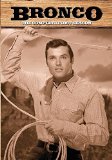| Reviews & Columns |
|
Reviews DVD TV on DVD Blu-ray 4K UHD International DVDs In Theaters Reviews by Studio Video Games Features Collector Series DVDs Easter Egg Database Interviews DVD Talk Radio Feature Articles Columns Anime Talk DVD Savant Horror DVDs The M.O.D. Squad Art House HD Talk Silent DVD
|
DVD Talk Forum |
|
|
| Resources |
|
DVD Price Search Customer Service #'s RCE Info Links |
|
Columns
|
|
|
Bronco: The Complete First Season (Warner Archive Collection)
"Bronco! Bronco!
Bronco Layne!
Born down around the old panhandle,
Texas is where he grew to fame.
There ain't a horse that he can't handle,
That's how he got his name.
Bronco! Bronco!
Tearin' across the Texas plain!
Bronco! Bronco!
Bronco Layne!
Next to a four-square Texas twister,
You'd call a cyclone meek and mild.
You've never seen a twister, mister,
'Till someone gets him riled.
Bronco! Bronco!
Tearin' across the Texas plain!
Bronco! Bronco!
Bronco Layne!
Show me a gal who kissed him once,
I'll show you a gal who's kissed him twice.
Once any gal has kissed him twice,
She's dreamin' of shoes and rice.
Bronco! Bronco!
Tearin' across the Texas plain!
Bronco! Bronco!
Bronco Layne!"
The last piece of the Cheyenne puzzle. Warner Bros.' Archive Collection of hard-to-find library and cult titles has released Bronco: The Complete First Season, a somewhat misleadingly-titled 5-disc, 20-episode collection of what really should be called Cheyenne: Bronco's third 1958-1959 season. Starring Ty Hardin as ex-Confederate officer Bronco Layne, this first season of the hit Western series Bronco wasn't really called Bronco back then because, you see, well...it's all explained below. Done up with typical late '50s Warner Bros. assurance, these initial Bronco episodes may not have quite as accomplished a headlining actor as Cheyenne or Sugarfoot did, but they're still well-written and professionally executed ( ...and while he's no Olivier, strapping amateur Ty Hardin does just fine here). No official extras to speak of, but the original Sugarfoot tags with Will Hutchins (promoting Hutchins' upcoming episodes) are included here--a nice bonus that we didn't get in the other WB Western releases. And as expected, the fullscreen black and white transfers are quite nice.
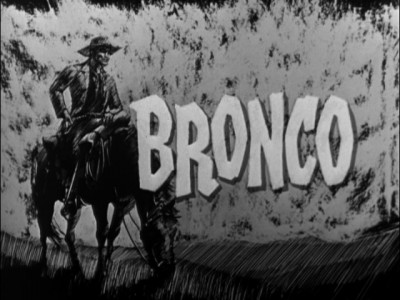
If you want to know the history of Bronco's inception, you first have to know about Clint Walker's Western series, Cheyenne. I've written before in several reviews about Cheyenne's complicated production and various incarnations, but briefly, in 1955, ABC, the smaller, struggling network of the "Big Three" in TV, approached Warner Bros. with a deal to buy their backlog of motion pictures that hadn't yet aired on TV. Having seen the success that Walt Disney had with his heavily-promotional Disneyland program, Warner Bros. suggested creating wholly original programming (based on past WB hit movies) within a rotating anthology format. Warner Bros. Presents premiered on ABC on September 13th, 1955; the three series were Kings Row, Casablanca, and Cheyenne, network television's first hour-long Western, starring newcomer Clint Walker. Cheyenne proved far more popular than Warner Bros. Presents' other two spokes of its anthology wheel, with the Cheyenne episodes garnering Nielsen Top Twenty ratings whenever it aired every third week or so. Warner Bros. dropped the Warner Bros. Presents framework for the 1956-1957 season, and alternated Cheyenne with a new, independent anthology show, Conflict; this was done because of Cheyenne's extended 7+ day shooting schedule. Conflict only lasted this second season of Cheyenne, creating yet another drag on Cheyenne's time slot's overall year-end ratings.
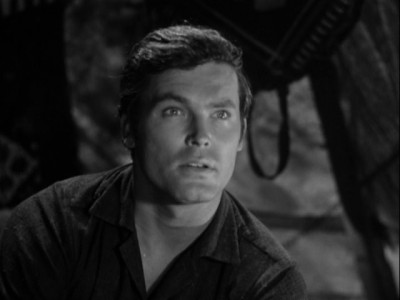
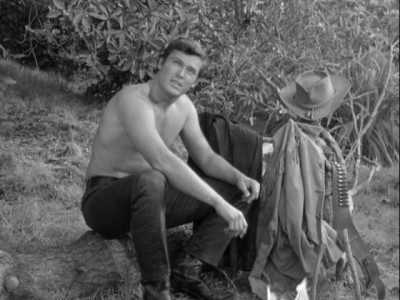
Enter Western Sugarfoot for the 1957-1958 season, which alternated with Cheyenne on the same Tuesday night 7:30pm time slot. A sizeable, complimentary hit, Sugarfoot placed on its own at 24th in the Nielsen's, while Cheyenne's ratings exploded, landing Walker's episodes as the 13th most-watched "series" of the year--a remarkable showing for two "split" series. Due to a penurious, restrictive contract with WB, exacerbated by the show's punishing schedule, Walker simply walked off Cheyenne at the end of the 1957-1958 season. Warner Bros., the first major Hollywood film studio to successfully launch original programming on its rival platform--television--wasn't about to give up this lucrative source of income. So, Cheyenne continued for the 1958-1959 season with a mix of repeats from Walker's first two season episodes, new Sugarfoot episodes, and new episodes of Cheyenne filmed with Ty Hardin, filling in as new wanderer, Bronco Layne. The result? The Sugarfoot episodes actually rose in the ratings, finishing off the year as the 21st most-popular "series" the year, while the Cheyenne Walker repeats and Ty Hardin "Bronco" episodes fell to a still-sizeable 18th for the year.
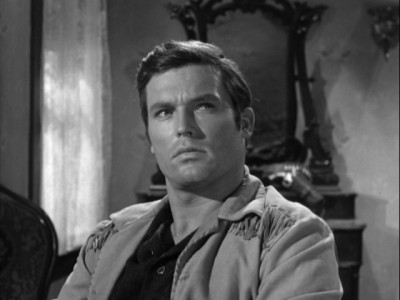
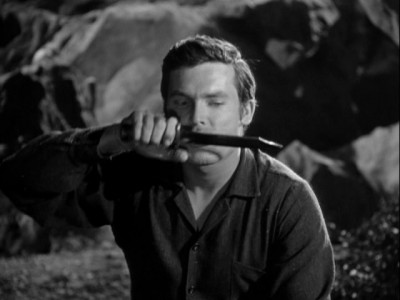
Got that? Okay, so that leaves us now with Bronco. If you've read my reviews of Cheyenne and Sugarfoot, then you'll know how I feel about other writers' dismissive comments specifically aimed at the "cookie cutter" WB Westerns from this time period and their "boiler plate" construction and execution: after surveying the gradual demise of reliably entertaining network programming over the past 30 years...bring on more cookie cutter boiler plates, I say, especially if they're going to be as well-written, as well-directed, and as well-performed as something like Bronco. Now, to be fair: is there anything terribly original or striking to Bronco in terms of scripting or directing or even performance? No. After all, it merely served as a continuation of Cheyenne, with another performer (and a new character name) plugged in at the last moment. It wasn't designed as some sort of "alternative" to the standard TV Western format that was getting a real workout in 1958 (such as Sugarfoot's non-violent lead character). The series' framework is generic: a loner wanders from town to town, helping people he meets along the way. We don't learn a whole lot about Bronco Layne's makeup or motivations; that way, he can stay mysterious and intriguing to the audience...while being anonymous enough to allow a broad range of viewers to take a shine to him by filling in the character's blanks with their own expectations. In School for Cowards, we learn that Bronco was orphaned as a young boy, that Indian friends taught him many things as a youth, that he served in the Confederate 3rd Texas, that he was captured at Shiloh and subsequently incarcerated at Elmira, and that after the war he scouted a little bit for General Hunter. And that's it for this first season. And of the three WB Westerns discussed, Bronco's Ty Hardin was arguably the least accomplished in terms of straight acting technique (Cheyenne's Clint Walker had rather startling big-screen star magnetism right out of the box, while Sugarfoot's Will Hutchins could nimbly essay anything from comedy to drama to action). That isn't to say Hardin wasn't talented (he was quite good in the better-than-expected big-screen WB drama, Wall of Noise), but at this early point in Bronco, he's more or less fitting a "type"--handsome, strapping, rough-and-tumble-but-also-kind loner--than actually playing a shaded, layered character. In other words, he's true to the series' form itself: unapologetically square and solid..,and quite entertaining. Let's look very briefly at the episodes.
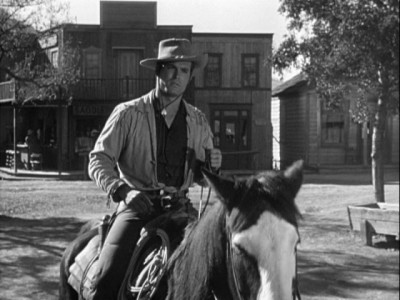
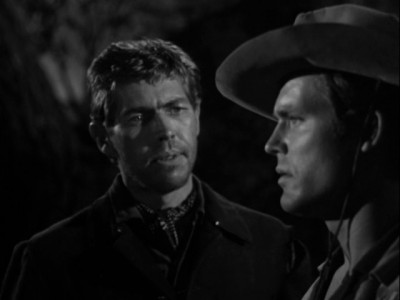
The season opener, The Besieged, is a tight, concise exercise in siege action, as Bronco tries to save a pacifist religious family (including Robert Warwick and Sue Randall) from the likes of Claude Akins and Jack Elam. Ty Hardin may not always look like he knows what to do with his hands, but he moves well in the action scenes, and he has an unschooled earnestness that's immediately appealing. A good example of how the networks--despite what critics assume today--played "hands off" with overtly religious themes. It's made clear that Bronco is non-religious, but after initial irritation and incomprehension at the family's refusal to fight, respectful of their beliefs ("I wish I had your faith," he states, before contemplating the lessons learned his encounter: "I don't know...there's a lot to think about. All I know is that it happened. I'm humble and grateful."). Tom Blackburn's Quest of the Thirty Dead--Bronco investigates a mysterious train wreck that killed is friend, Peter Breck--looks awfully familiar to similar outings on both Sugarfoot and Maverick, but good actors like Jay Novello, Tol Avery, and particularly Ray Danton (who never seemed to get a vehicle that fully showcased his talents) help. Unfortunately, the preachy The Turning Point, from George Slavin, tries to sell a facile message in the wrong format, when it has Bronco meet "Ty Hardin's" namesake, John Wesley Hardin (Scott Marlowe, excellent as always). An obvious Freudian meller (Daddy R.G. Armstrong just didn't hug Marlowe enough growing up), the real hoots come when sheriff Walter Coy delivers this puerile, biting-the-hand-that-feeds-you sermon about Western violence...on a Western TV show that never fails to serve up violence-as-entertainment: "There's a kind of madness out here: a fast-gun, die-with-your-boots-on maleness that's for 10-year-old kids with wet noses and toy pistols. Men don't have to die like tin heroes to prove they're men," (I'll bet Jack Warner hit the roof on that self-loathing doozy). By the time Bronco is upbraiding the town for mistreating Hardin, we're heading for the saloon exits. Much, much better is Dean Riesner's Four Guns and a Prayer, a Three out of Seven Samurai take-off that has Bronco bringing in hired guns Douglas Kennedy (smooth), Walter Barnes (big and gruff), and Gary Vinson (as the Ringo Kid's kid), to clean up an "open" town...with deadly results. A memorable episode, with the hired guns' final moments genuinely effective (Barnes' death wish plea of "Just one more, please...just one more...." could have come right out of Peckinpah).
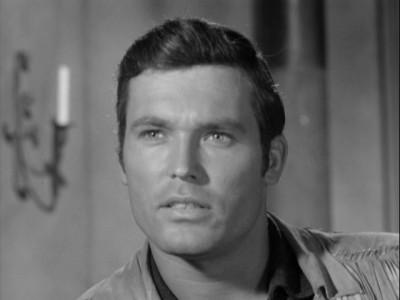
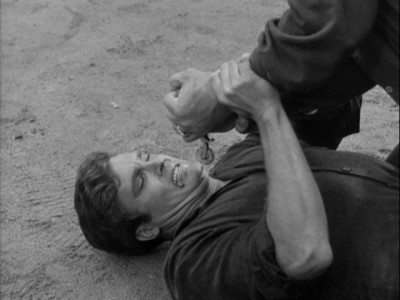
Another season-best offering, The Long Ride Back, from James O'Hanlon, finds Bronco returning to his home town for the first time since he fought for the Confederacy, where he finds he's not welcome. Framed as a flashback by Mexican pawn broker Gerald Mohr (always a solid pro), telling the story of his friend Bronco, this beautifully-constructed episode hits all the right buttons for a small-scale "epic" TV Western, including memorable set-pieces (a nicely-handled poker game, and a terrific finale where Bronco tracks down his nemesis in order to duel with him at high noon), and a final shot worthy of John Huston. Richard Kandau's Trail to Taos sports an agreeably cynical set-up--newspaperman Thomas B. Henry wants a shooting war to continue with the local Indians to keep the Army...and its dollars, from leaving the territory--and some good performances, particularly Vince Barnett in a small but hilarious bit as an innkeeper with indigestion ("...something in the hash I cooked," he moans). The good episodes keep on coming with Berne Giler's Brand of Courage, a frequently amusing outing where Bronco helps a group of cattle-ranching nuns fight off other ranchers who want them to fail. That old scene-stealer, Cheerio Meredith as one of the nuns, seems delighted with handsome Hardin's kidding, while there's a wonderful final shot of the peace-loving nuns watching violent Bronco ride out of their lives (George O'Hanlon asks the departing Bronco, "Ain't comin' back, huh?" to which Hardin takes a beat and simply replies, "...I guess not,"--a perfect summation of the Western loner hero who simply can't stay put). Freeze-Out, from Tom Blackburn, is an enjoyably melodramatic mystery, where Bronco tries to figure out who's lying (hint: they all are) as a group of travelers become mighty interested in what's buried in that mountain glacier (The Virginian's James Drury shows up to good effect here, while Edgar Stehli's crazy old coot prospector, "Pancake Riddle," wins the "Best Supporting Character Name" award this season).
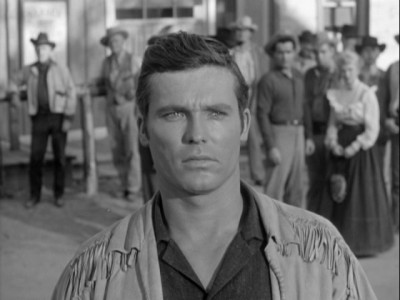
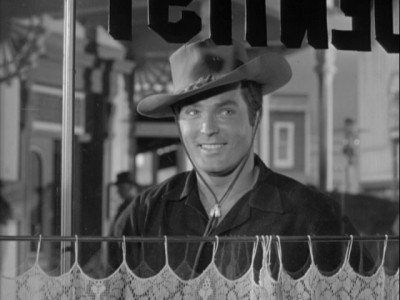
Had Gerald Drayson Adams' and Dean Riesner's Baron of Broken Lance just ended five minutes prior to the no-doubt network-demanded "happy ending," this would have been a season-best offering: Bronco's friend William Reynolds wants to marry Shirley Knight; however, her hated rancher father King Calder won't have it, and chases the couple down to Bronco's wagon train. Right when we think rat-bastard Calder is going to die, he refuses to "forgive" his daughter for surviving the childbirth that killed her mother and his beloved wife. "Wow," we think...before everything is too-patly tied up. A season-best (there seems to be more and more of them...) is offered up by George Slavin in his Payroll of the Dead, a terrific entry that has Bronco inadvertently hooking up with scammers John Dehner (perfectly cast) and fellow WB contractee James Coburn as the two try to con no less than Sitting Bull himself (Francis MacDonald) out of the "little green papers" that the Indians took at the Little Big Horn massacre. We learn Bronco's Indian name here (the cool "White Rain"), as Hardin gets the tough job of holding his own against scene-stealers Dehner and Coburn (his underplaying works well against the two stronger performers). That final shot of Dehner fruitlessly running around Little Big Horn could have come right out of The Treasure of Sierra Madre. Tom Blackburn's Riding Solo is a solid outing that features two good performances from old pro Will Wright as an opinionated doctor and David Leland as deputy "Tub" Murphy, as they back up Bronco when a town turns on him, calling him a coward when a stage he was guarding is robbed. Bronco, normally a forgive-and-forget character at the fade-outs, this time tells cutie Anne Anderson to get lost when her faith in him fails (hilariously, she immediately turns to another guy). Borrowed Glory, from Berne Giler, is a familiar-enough story--war "hero" Robert Vaughn earned his medal by taking it off a "corpse"...who comes back for a favor--but it benefits from not only Vaughn's careful turn, but also future The FBI's William Reynolds' excellent performance as a silky bad guy (he should have stayed a villain in his career).
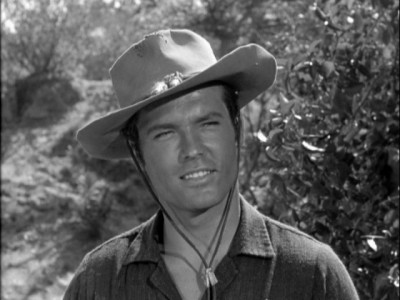
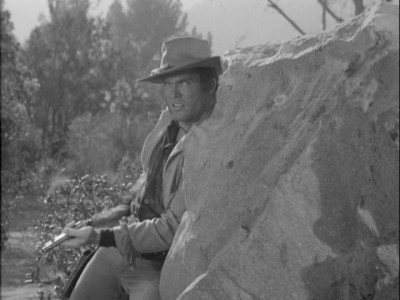
Arnold Belgard's and Tom Gries' Silent Witness finds Bronco returning to friend Karl Swenson's mine, where the drunken Irishman is getting squeezed out by a local "protection association." An entertaining outing for this familiar storyline (with good support from familiar faces like Russ Conway and Karl "Killer" Davis), Hardin does particularly well in his scenes with sweet-natured Sherri Alberoni as the mute child who takes a shine to handsome Bronco Layne (there's also a well-choreographed fistfight). Bonanza fans will enjoy The Belles of Silver Flat, from Bob Fisher and Alan Lipscott, when Pernell Roberts (having a good time, it looks like) shows up as a reformed gunslinger-turned-preacher who's trying to get a church built in a corrupt town. Watch for Chubby Johnson and Hank Worden as two backwoods coots looking to hijack themselves some dance hall girl wives (Bronco's trick with the girls and some stolen, hidden money is quite fun). Albert Aley comes up with a winner in Backfire where deputy sheriff Bronco discovers his "hero" boss Barry Kelley is in league with crooked Jeff York, who really runs the corrupt town. An engrossing little outing (it could have worked equally well as an urban noir), with a deeply ironic ending (and look for WB contractee Troy Donahue incongruously being pushed into yet another James Dean-ish role, this time as a punk gunslinger looking to get ventilated). School for Cowards, from George Slavin, mixes a familiar mystery (is someone trying to kill little half-White half-Indian Tommy Andre?) with an examination of racial prejudices, when Bronco takes an instructor's job at a boy's military school. Bronco lays out his feelings on race with no moral shilly-shallying: "There's nothing wrong with being an Indian," he flatly states. Look for a slimy Mike "Touch" Connors here, as well as Barry Atwater playing the martinet leader of the school (the always good Jeanne Cooper is wasted, though, in a nothing part).
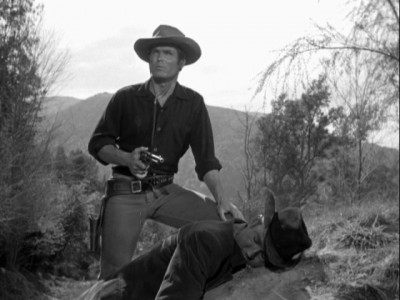
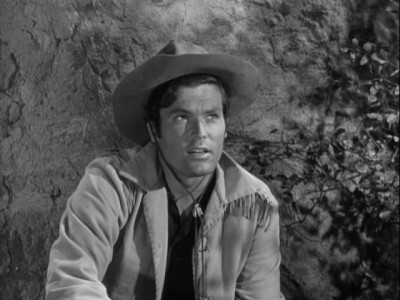
Sexy Arlene Howell of Bourbon Street Beat has a good part in Arnold Belgard's Prairie Skipper, where soon-to-be TV superstar Lorne Greene pre-channels one of Adam Cartwright's early careers--sea captain--when he rather incongruously hooks up with Bronco's wagon train, having married on-the-run con woman Howell. Howell's vamping is matched by Greene's enjoyably hammy turn (he was perfect for this kind of television), while a feisty Bing Russell gets more screen time here than he usually did on Bonanza, as Bronco's almost-sidekick. One of my favorite entries this season, Albert Aley's Shadow of a Man, neatly sums up the escapist, wandering-feet appeal of these TV Westerns to their harried 1950s audiences, with Bronco's opening narration: "To a drifter like me, every day's a piece of life all its own. It begins in the morning and ends at night. And if I'm lucky enough to shoot fast and straight...well, I'm born all over again the next set-up," (Aley tops himself when he has carefree Bronco toss a coin to see which way to go, cynically foreshadowing the trouble Fate has in store for him: "Seeing as how things turned out, it [the coin] must have been counterfeit." Beautiful). A tense, tight outing, with Wayne Morris particularly good as the seemingly genial friend to Bronco...who'll kill him if he has to. Arnold Belgard had a good thing going with Hero of the Town, when Bronco is again labeled a chicken by a town when he's the only survivor of a bank robbery. Unfortunately, the too-neat ending is ludicrous, ruining the episode's overall effect. Finally, Fenton Earnshaw's and Dean Riesner's Red Water North gets Bronco off dry land and onto a paddlewheel boat in this familiar-feeling mystery (he's hired to deliver the boat...but someone wants it sunk). Karl Swenson, hiding behind a jaw warmer, is back again, while Michael Forest embarrasses himself not as his usual cigar store Indian, but rather this time as a Creole first mate (that accent...). One of my favs, Kelly Thordsen, is rubbed out way too quickly, while talented WB contractee Dorothy Provine isn't given much to do.
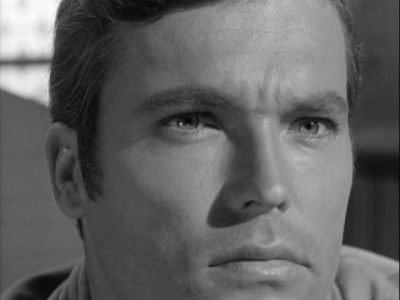
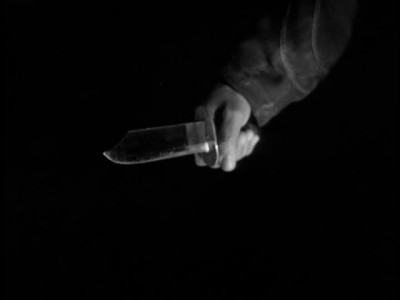
The Video:
The fullscreen, 1.37:1 black and white transfers for Bronco: The Complete First Season look sharp, with solid blacks, mostly good contrast (a few scenes from time to time look a little blown out--but nothing major), a sharpish image, and the expected level of screen imperfections (low).
The Audio:
The Dolby Digital English mono audio track is fine, with low hiss and a decent re-recording level. No subtitles or closed-captions.
The Extras:
No extras for Bronco: The Complete First Season.
Final Thoughts:
You know something? As I was writing this...I realized it was even better than I originally thought. Warner Bros. continued their hit Western formula with Cheyenne's third season Bronco's first season, executing 20 hour-long oaters with their expected level of glossy professionalism. Good writing, no-nonsense direction, and excellent supporting turns--with newcomer Ty Hardin doing just fine in his first big break--make this an unpretentious winner. I'm highly recommending Bronco: The Complete First Season.
Paul Mavis is an internationally published movie and television historian, a member of the Online Film Critics Society, and the author of The Espionage Filmography.


|
| Popular Reviews |
| Sponsored Links |
|
|
| Sponsored Links |
|
|
| Release List | Reviews | Shop | Newsletter | Forum | DVD Giveaways | Blu-Ray | Advertise |
|
Copyright 2024 DVDTalk.com All Rights Reserved. Legal Info, Privacy Policy, Terms of Use,
Manage Preferences,
Your Privacy Choices | |||||||









